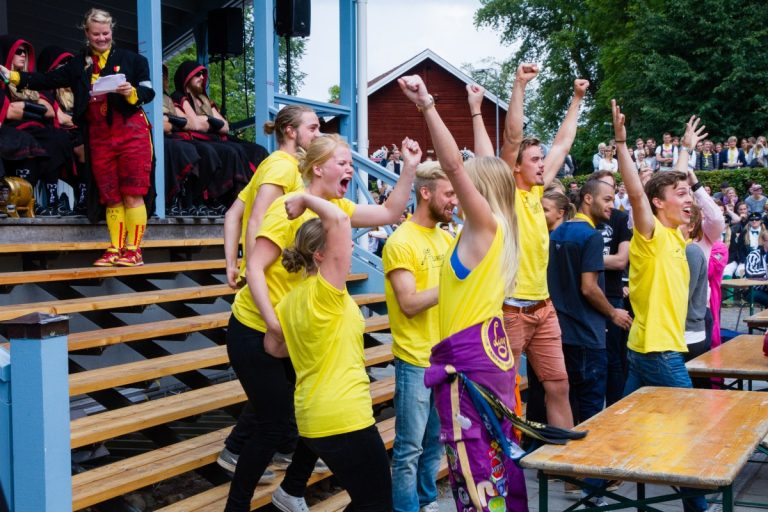
Found in the historical city of Linköping, Sweden, Linköping University (LiU) grants students the unique opportunity to embrace rich culture whilst also being part of one of the fastest growing tech cities in the world. Set a mere two hour drive away from Stockholm, students here get the very best of both worlds, enjoying the exciting culture of an up-an-coming city and being close to Sweden’s thriving capital.
This university has been recognised as one of the Top 30 young universities by the QS World University Rankings, and it has quickly made its name as one of the most internationally-friendly universities on the globe.

“Students from Asia and Africa that come here for a short period to study and do research tell me that even though LiU is geographically far away from the developing countries and their issues, the university is very relevant in our research,” says Joyanto Routh, Assistant Professor for Water and Environmental Studies and teacher of the MSc in Science for Sustainable Development.
Boasting a massive student body of 27,000 students and 4,000 employees, there is never a dull day for those at Linköping. As member of such a large and diverse community, you are bound to meet friends you connect with and academics that inspire, making your university experience as rich as you imagined.
Over 25 masters courses in five subject areas are taught in English, including the MSc in Experimental and Medical Biosciences, the MA in Ethnic and Migration Studies, the MSc in Design, and the MSSc in Computational Social Science.
Particularly renowned for their applied science degrees, the two-year MSc in Science for Sustainable Development will prepare you to solve real-world problems and build a sustainable future.
The university understands the breadth of knowledge needed to create the next leading mind in sustainable development, which is why Faculty take an interdisciplinary-holistic approach to teaching practice.
Students will have the opportunity to gain a multidisciplinary understanding of issues surrounding sustainable development, as well as an awareness of their real-world application.
“The courses cover a broad range of topics – from climate change and biodiversity loss to feminism and colonisation. Also, the students are from all over the world – it’s not only fun to be exposed to such a huge diversity of cultures, but in the class, it actually feels like a global cooperation in tackling these issues,” says Karolina Gurjazkaite, student of the course.
One of the most innovative aspects of the programme is the unique learning portfolio that all students create. You will work with an academic to identify your individual skills, set your own goals and progress towards your objective. This gives you an edge over graduates of other universities or disciplines, as you already have experience of independent assessment and self-motivation.
Students will be taught by leading minds in the field of sustainable development, as well as practically demonstrating their skills through coursework for external university partners. Through this dynamic approach, students gain the theoretical knowledge and hands-on experience needed to develop real-world skills.
If your interests lie in the field of Life Science, the MSc in Experimental and Medical Biosciences will fulfil your academic desire.
This course emphasises the role of cellular and molecular mechanisms related to health and disease. Students on the course develop comprehensive knowledge of bioscience with a focus on how this information can be applied in a real-world setting.

“The master’s programme in Medical Biosciences at LiU received the highest rating in the Swedish Higher Education Authority’s assessment of Sweden’s biomedicine programmes, with five of the evaluated learning outcomes being appraised as Very High Quality and the sixth as High Quality – the best result of all international biomedicine master’s programmes in Sweden,” the website explains.
The pursuit of study in Vienna, Austria, is also encouraged. A select number of students have the opportunity to expand their international horizons during second year through the programme’s exchange scheme. Not only will you gain broader global perspective, you will also finish the year with a Master of Science in Engineering, amounting to two qualifications by the end of the two years.
Independent learning is encouraged through research projects that mimic real-world application of topics like cardiovascular biology, stem cells, applied regenerative medicine, medical genetics and neurobiology.
“More importance is attached to practical applications than theoretical knowledge here, and we learn a lot on our own. The professors are always there to guide us, but – as they say – self-learning is the best learning” says Adrian, who currently studies the programme.
“You meet people from almost every part of the world. This gives you a diverse group of friends, a global exposure, and broadens your network,” he adds.
Follow Linköping University on Facebook, Instagram and LinkedIn
Liked this? Then you’ll love these…
Curtin University Sarawak: Research and teaching excellence
Leading European Universities for Research, Teaching and Innovation







